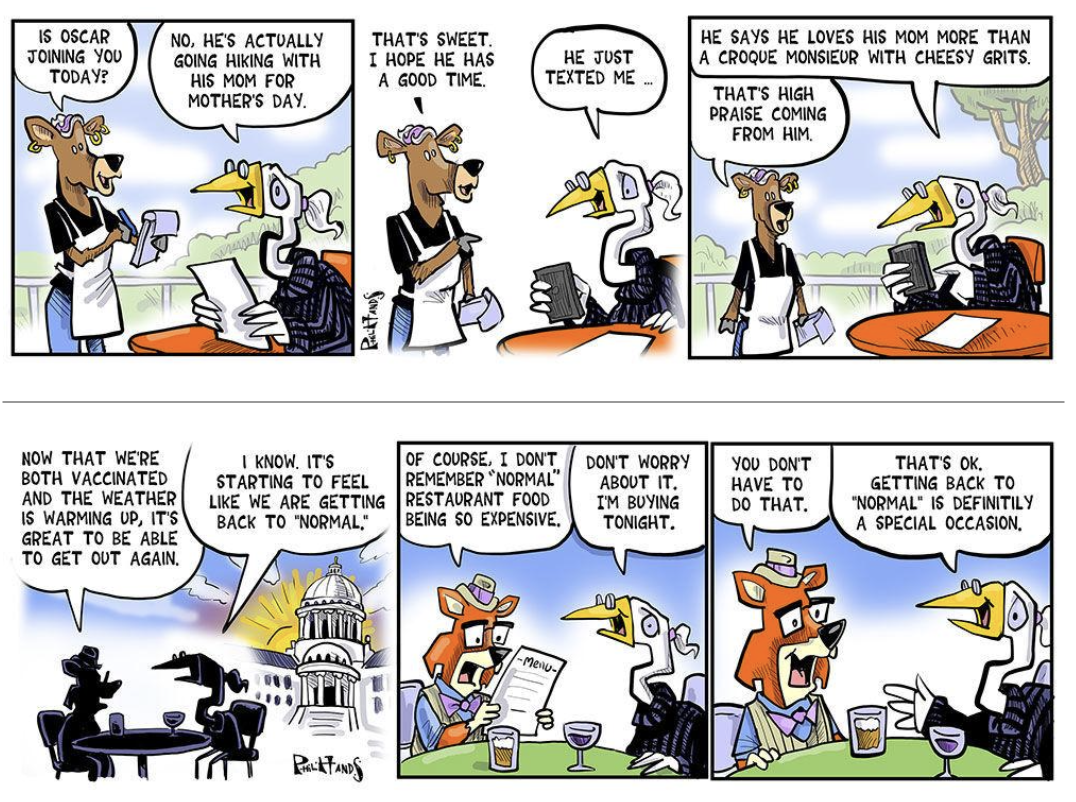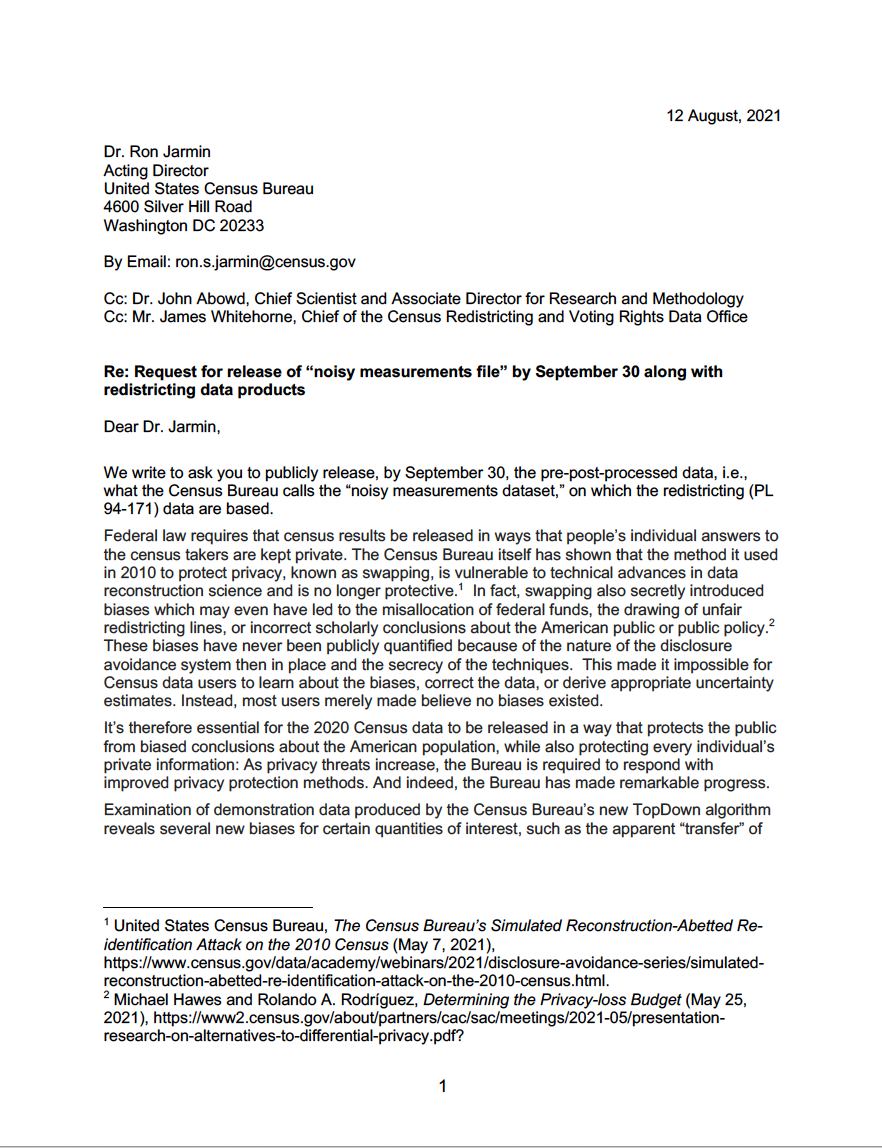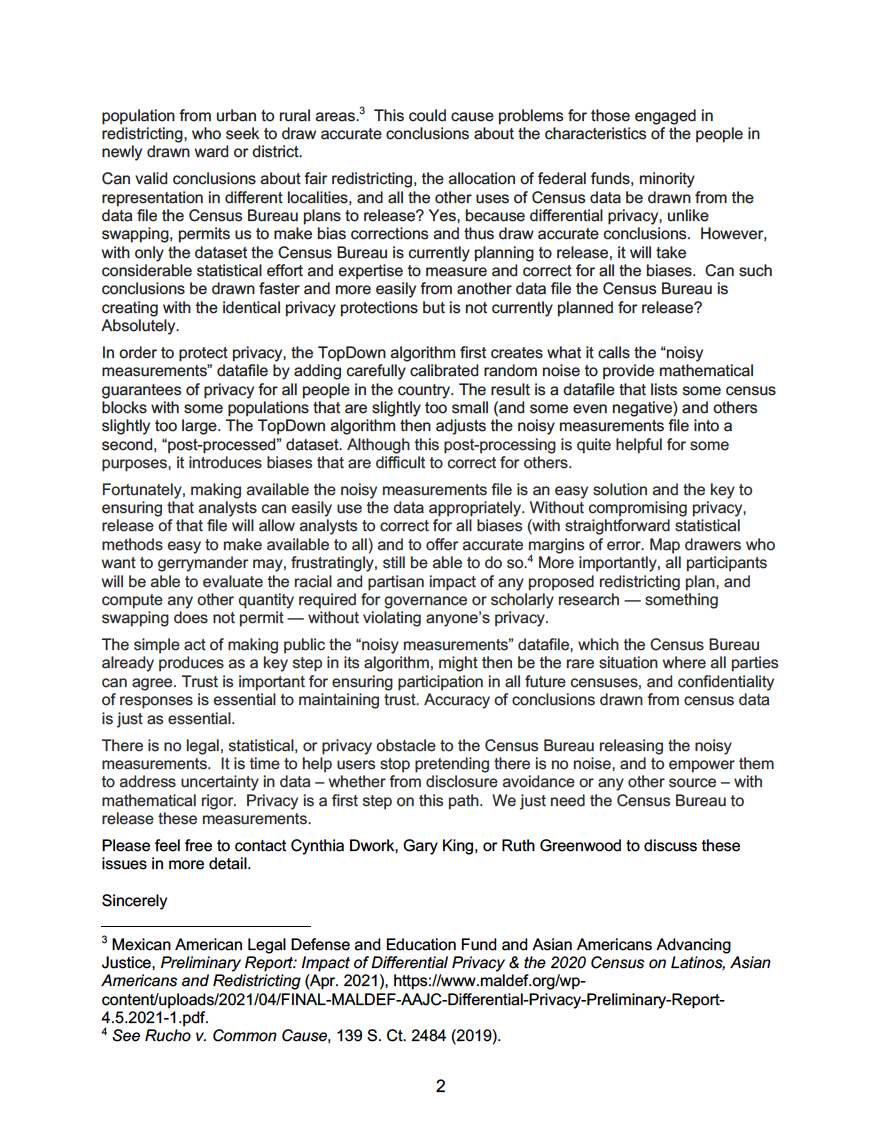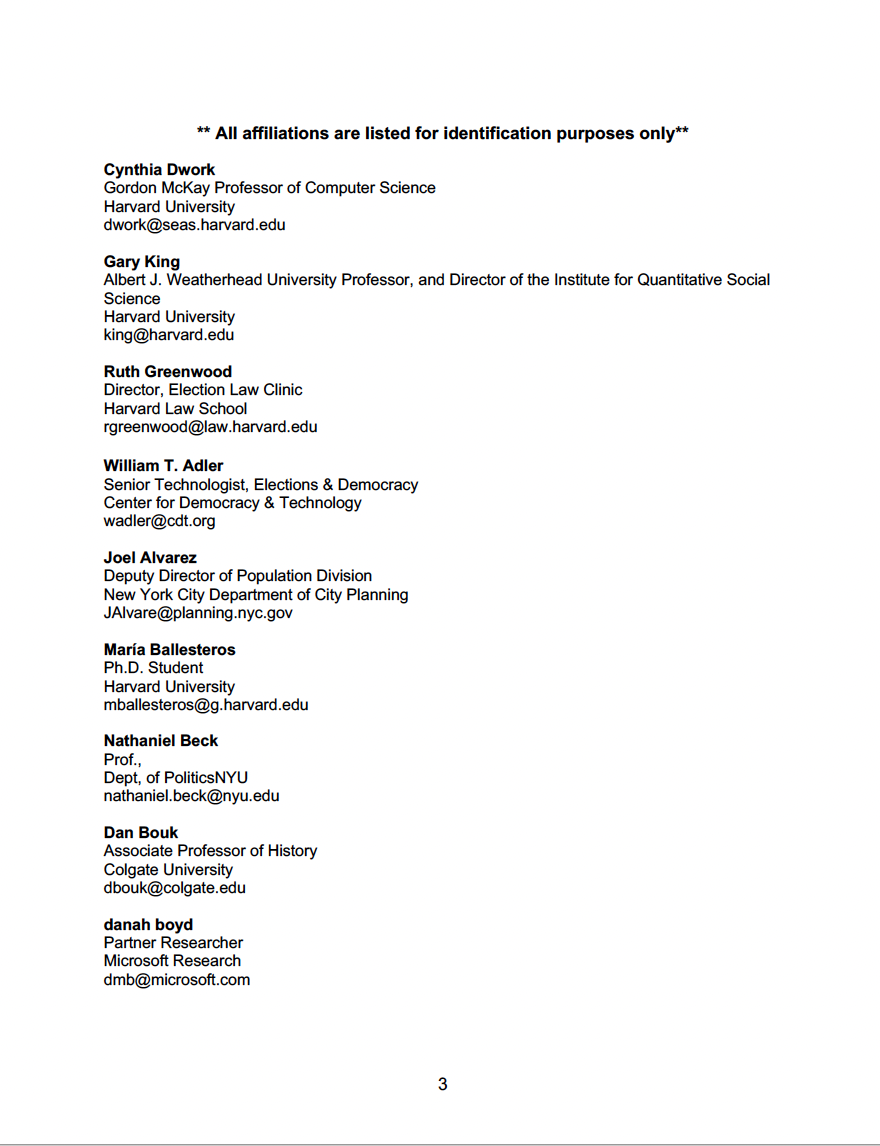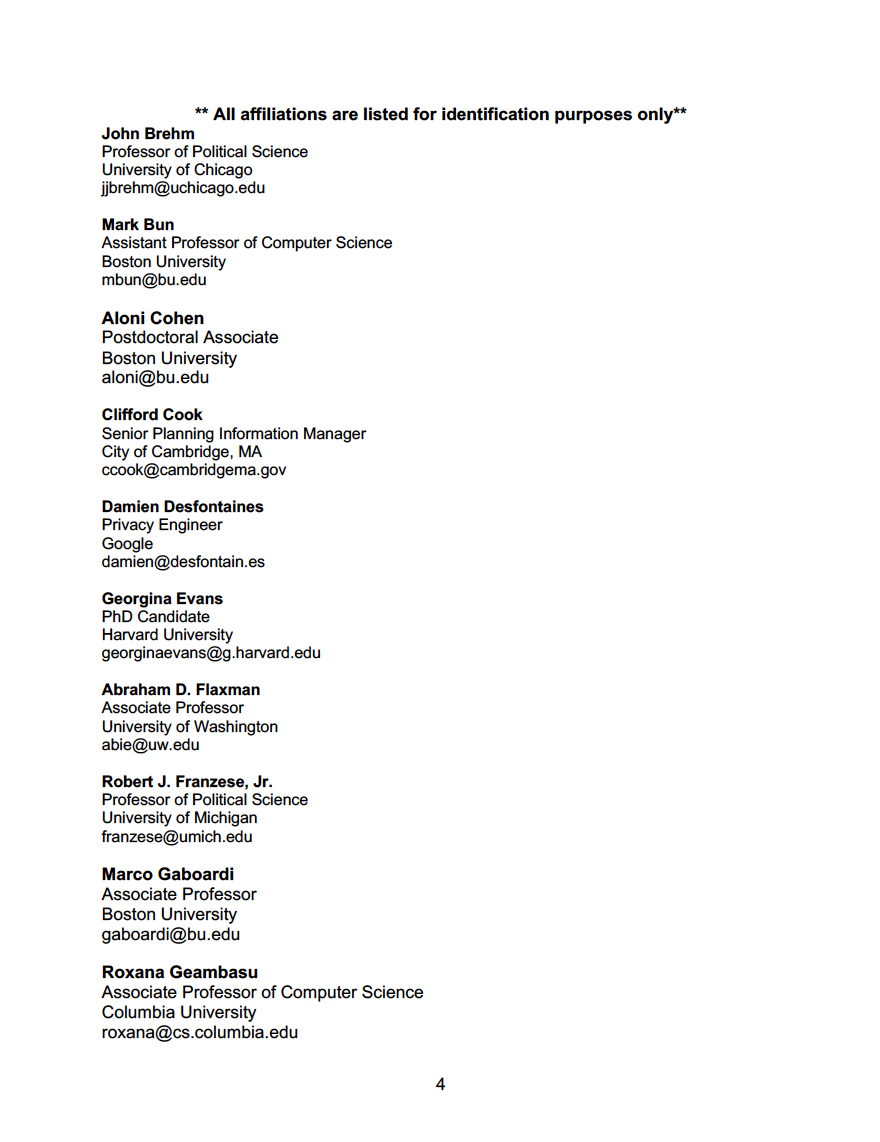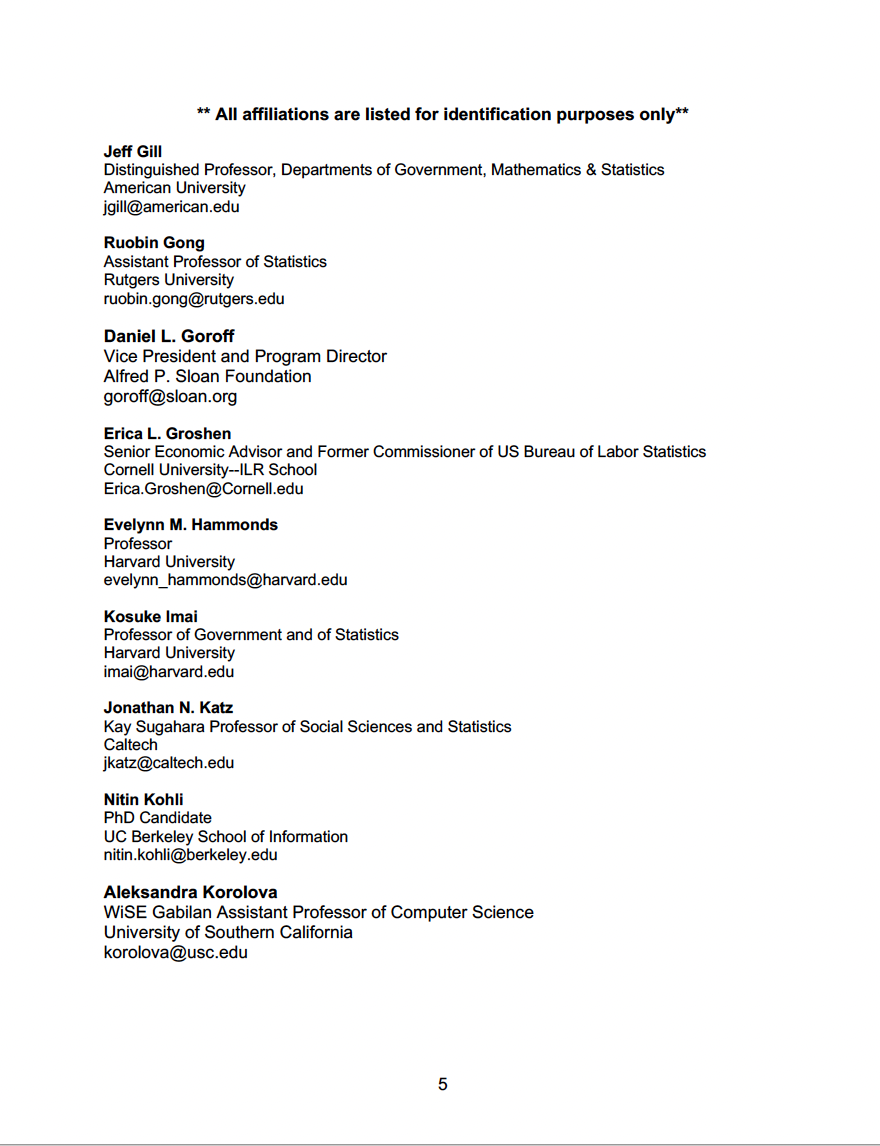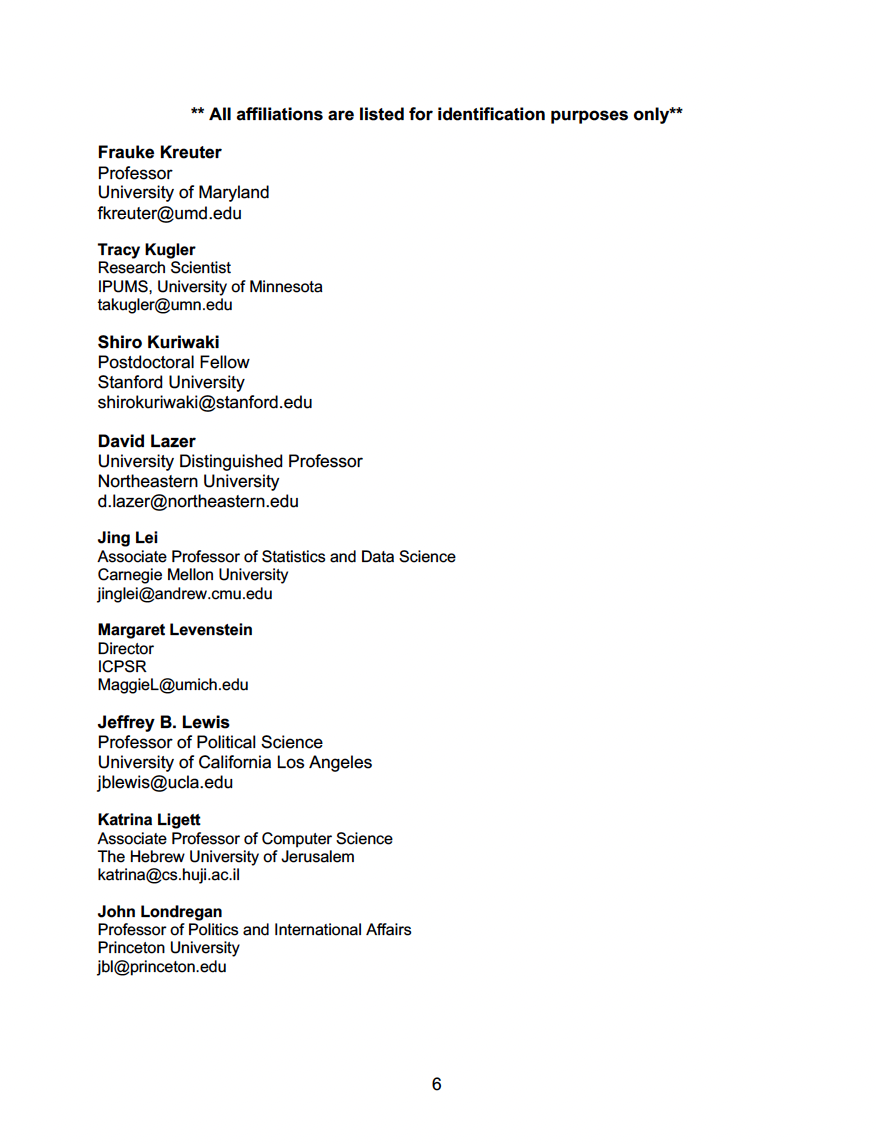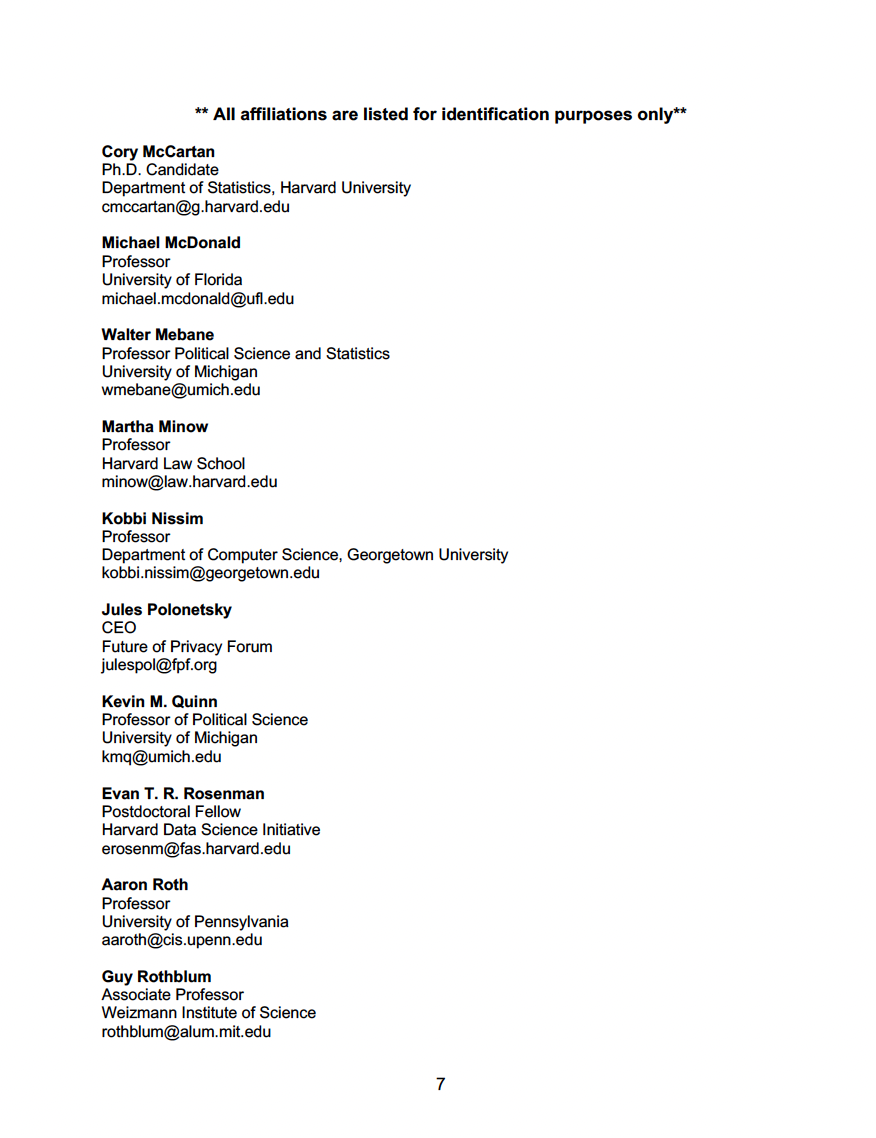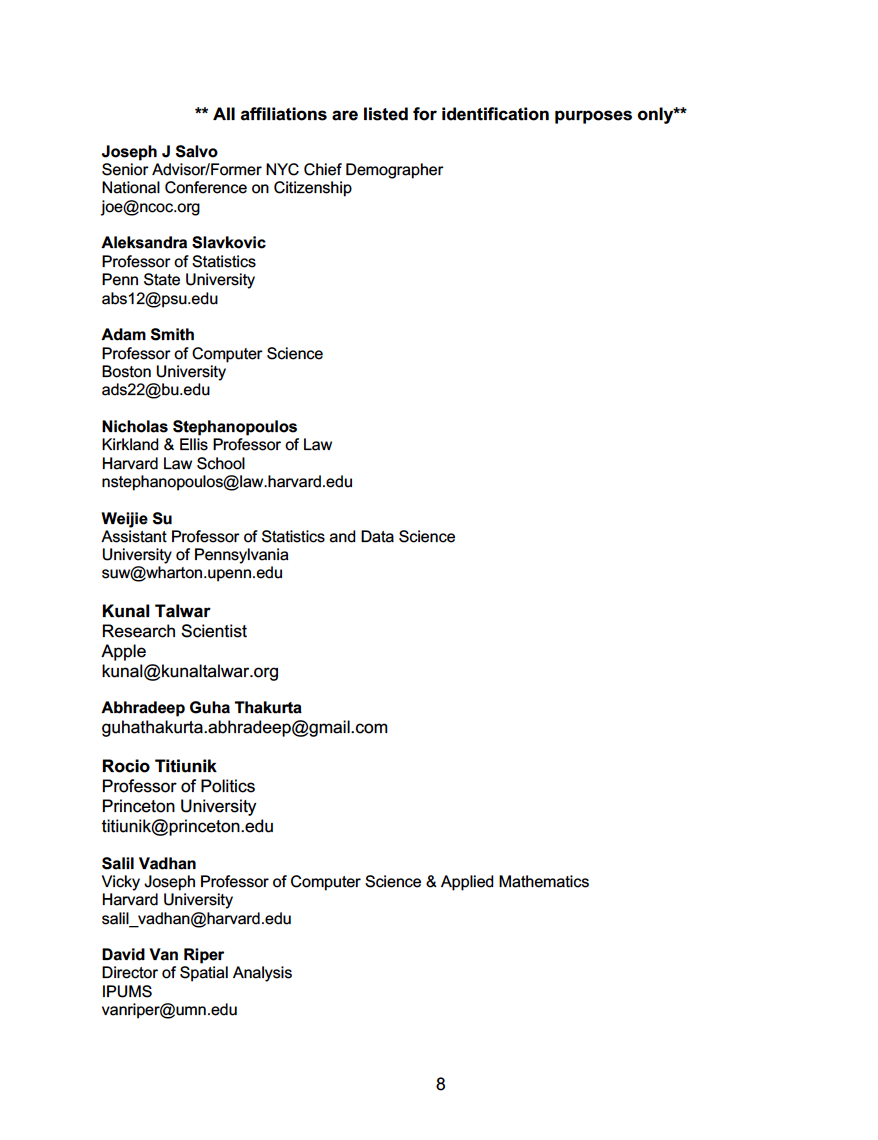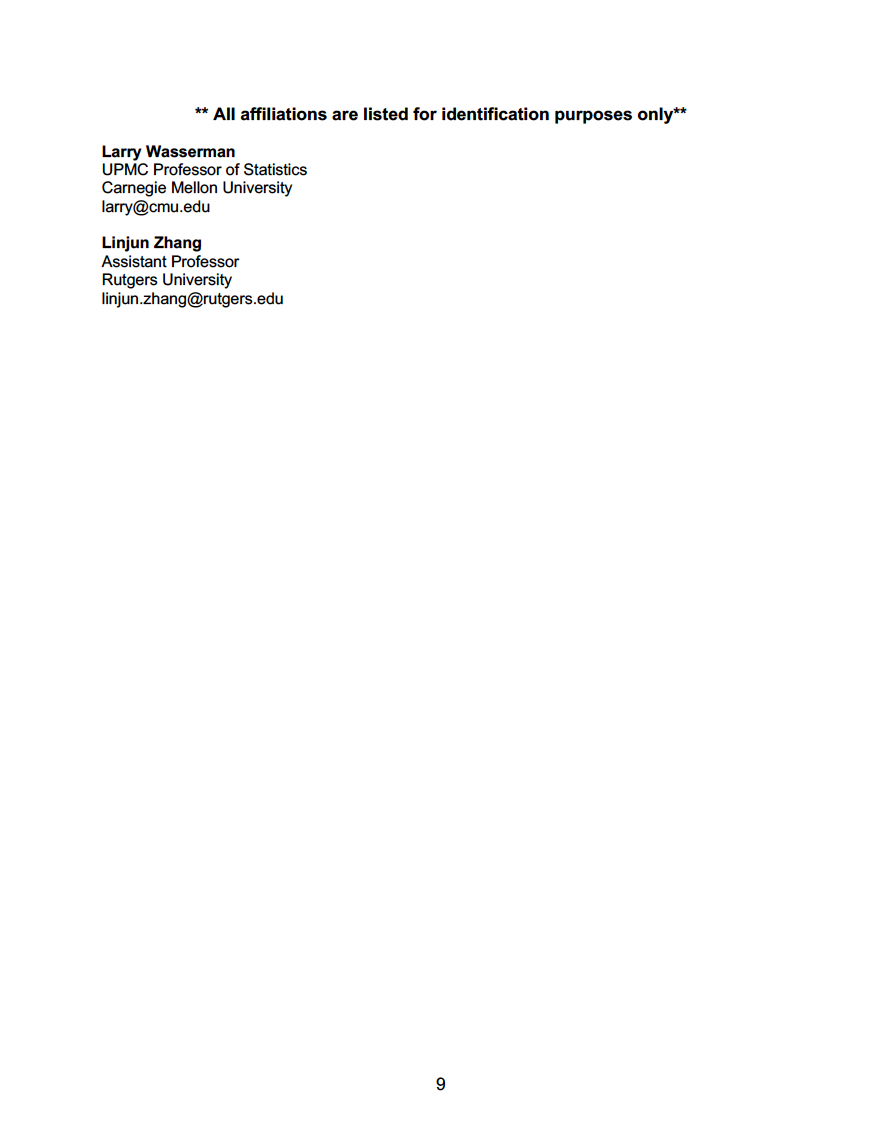ELC IN NEWS
Direct inquires to elc@law.harvard.edu
Election Law Clinic presents oral arguments in Jacksonville racial gerrymandering case
On Friday, September 16, Election Law Clinic clinical instructor Daniel Hessel led the plaintiff’s oral arguments during Jacksonville Branch of the NAACP v. City of Jacksonville’s preliminary injunction hearing, arguing against the use of racially biased redistricting maps in the 2023 and 2024 city council and school board elections.
Lawyers suing over Jacksonville City Council redistricting want injunction before '23 vote
Lawyers suing over Jacksonville City Council redistricting want injunction before '23 vote
Lawyers arguing new boundaries for Jacksonville’s City Council districts are unconstitutionally gerrymandered asked a federal judge Friday to block use of half of the 14 districts during the spring elections.
Lawyers suing over Jacksonville City Council redistricting want injunction before '23 vote
Lawsuit calls on Colorado Springs to move April elections to November to address racial disparities
The city of Colorado Springs is facing a lawsuit alleging racial discrimination in local elections.
The city of Colorado Springs is facing a lawsuit alleging racial discrimination in local elections.
A lawsuit filed against the City of Jacksonville…
A lawsuit filed against the City of Jacksonville and Duval County Supervisor of Elections Mike Hogan this week claims a new redistricting plan reduces the impact of the Black vote in minority-dominated areas of Jacksonville.
Harvard Law School election law expert Ruth Greenwood applauds the administration’s support for new voting legislation, but says the filibuster remains an obstacle
Weighing President Biden’s first year: Voting and election
Harvard Law School election law expert Ruth Greenwood applauds the administration’s support for new voting legislation but says the filibuster remains an obstacle
Harvard Law School election law expert Ruth Greenwood applauds the administration’s support for new voting legislation, but says the filibuster remains an obstacle
Challenges to the Voting Rights Act far from over
“If it hadn’t been for the Gorsuch line in Brnovich, I would have thought it was kind of a crazy argument,” said Ruth Greenwood, director of the Election Law Clinic at Harvard Law School, of the Texas brief.
The algorithm has primacy over media … over each of us, and it controls what we do
Experts on a Harvard Law School panel warn that Facebook and Google have already damaged democracy.
Experts on a Harvard Law School panel warn that Facebook and Google have already damaged democracy.
Lawsuit dislodges election dates from DeSantis
Theresa Lee with Harvard’s Election Law Center and one of the lawyers representing voters who sued DeSantis said in an email that while everyone is “thrilled” the lawsuit “forced the governor’s hand to carry out the duties of his office”
Theresa Lee with Harvard’s Election Law Center and one of the lawyers representing voters who sued DeSantis said in an email that while everyone is “thrilled” the lawsuit “forced the governor’s hand to carry out the duties of his office” they are not satisfied with the dates he picked out.
Following a lawsuit filed by the Election Law Clinic, Governor Ron DeSantis called special elections for three majority-Black legislative districts, to be held in early 2022.
After ninety-one days of inaction, Governor Ron DeSantis finally called special elections for three majority-Black legislative districts with Executive Order No. 21-224. The Election Law Clinic previously filed a lawsuit to compel the Governor to fulfill this duty.
OCTOBER 29, 2021
Case: Staples v. DeSantis
Download Press Release
TALLAHASSEE, FL – After ninety-one days of inaction, Governor Ron DeSantis finally called special elections for three majority-Black legislative districts with Executive Order No. 21-224. The Election Law Clinic previously filed a lawsuit to compel the Governor to fulfill this duty.
“We are thrilled that our lawsuit and our clients’ willingness to stand up for themselves and their neighbors in court have forced the Governor’s hand to carry out the duties of his office,” said Theresa Lee, litigation director of the Election Law Clinic.
However, the timeline set by Governor DeSantis could leave the districts without representation for almost the whole of the 2022 legislative session.
“This is a slap in the face of voters of color,” Ms. Lee said. “The Resign to Run law is designed to allow the lower vacancies to be on the same election schedule as the vacancy for the highest empty office. That these elections are not held on the same timeline as the election for the 20th Congressional District shows that Governor DeSantis does not have respect for the statutory scheme the legislature laid out many years ago or for Florida voters.”
The Election Law Clinic is considering all avenues of further relief.
# # #
Facing lawsuit, DeSantis sets special elections for South Florida legislative races
DeSantis, a Republican, was accused of waiting too long to set election dates to fill the vacancies in a lawsuit filed 12 days ago by the Harvard Election Law Clinic on behalf of Broward and Palm Beach voters.
ELC Files Friend of the Court Brief on Behalf of Five Former Whitford Plaintiffs Urging Court Not to Bake in Last Decade’s Partisan Gerrymander for Another Ten Years
The Wisconsin Legislature and its allies have asked the Wisconsin Supreme Court to redraw the State’s map in a way that would solidify the State’s 2011 partisan gerrymander for the next decade. ELC is representing five plaintiffs from Whitford v. Gill as amici curiae who want to ensure that the Wisconsin Supreme Court does not perpetuate the gerrymander under the guise of a “least-change” approach.
October 25, 2021
CASE: Johnson v. Wisconsin Elections Commission
PRESS RELEASE
BRIEF
WISCONSIN – Today, the Election Law Clinic at Harvard Law School (ELC), representing five former plaintiffs from Whitford v. Gill, filed a friend of the court brief urging the Wisconsin Supreme Court not to bake in the extremely gerrymandered maps that have distorted Wisconsin’s democratic governance for the last decade. Specifically, the brief seeks to ensure that the Wisconsin Supreme Court rejects a “least-change” approach—keeping old districts intact to the extent possible—should the Court intervene and draw new district maps.
On August 22, the Wisconsin Institute for Law & Liberty (WILL) filed a petition in the Wisconsin Supreme Court asking the Court to intervene in the redistricting process should the state government fail to enact new maps in time for the 2022 election (Johnson v. Wisconsin Elections Commission). WILL asks the Court to use a least-change approach to draw new maps. Such an approach would prioritize keeping the districts as gerrymandered as they were for the last decade, at the expense of all legally required redistricting criteria. A claim had previously been filed by individual Democratic voters in the federal district court for the Western District of Wisconsin (Hunter v. Bostelmann), asking that court to draw congressional, and state legislative districts for the state. It is not yet clear whether the state or federal court will ultimately draw the maps.
As the ELC brief illustrates, neither Wisconsin law nor its past practice justify taking a least-change approach to redrawing the State’s maps. It was not the practice of the legislature when it needlessly moved millions of voters from one district to another like pawns in a game. And it should not be sanctioned by law where, as here, the existing map is a proven extreme partisan gerrymander.
Over the five elections between 2012 and 2020, Democrats received an average of 49.2% of the statewide vote and yet received an average of only 37 of the Assembly’s 99 seats. Conversely, during that same time period, Republican candidates received an average of 50.8% of the vote and yet a whopping 63 of the 99 seats in the Assembly.
“Ten years of one-party advantage in a purple state was bad enough,” said Bill Whitford, amicus in the brief and former Whitford plaintiff.
“We must not let the partisan mapmakers of 2011 determine who constitutes the Wisconsin Assembly in 2030.”
“The Wisconsin Constitution declares that governments ‘deriv[e] their just powers from the consent of the governed.’ There is no such consent when the maps are rigged against Wisconsin voters,” said Wendy Sue Johnson, amicus in the brief and former Whitford plaintiff. “A representative government allows voters to choose their representatives in each election. When politicians preserve their partisan gerrymander and choose their voters, they are governing without our consent.
“The least-change approach proposed here is at odds with Wisconsin’s Constitution, and its mandated redistricting criteria,” said Mary Brown, a student in the Election Law Clinic who worked on the brief. “The Court should not favor an approach with no basis in Wisconsin law over redistricting criteria that Wisconsin’s Constitution explicitly mandates.”
“If the Wisconsin Supreme Court were to use a least-change approach, as the Wisconsin Legislature would have it do, the Court would be doing more than merely blessing a gerrymandered map — they would be drawing the gerrymander themselves,” said Meredith Manda, another student in the Election Law Clinic who worked on the brief. “The Court would be just as culpable as the 2011 map architects if they go with a least-change approach. Put simply, they would become ‘gerrymanderers in robes.’”
“There is no constitutional or statutory basis for a least-change approach,” said Jakob Feltham, attorney at Hawks Quindel and local counsel for amici. “If the Court takes the bait, they are effectively collaborating with the Assembly to rig the maps against Wisconsin voters. Wisconsinites’ faith in government and trust in the independence of the judiciary would only further erode if the Court bakes in this gerrymander.”
Republicans unveil proposed redistricting maps based largely on existing boundaries
Republican leaders on Wednesday unveiled their proposal for legislative and congressional district maps, which received immediate criticism for being based largely on existing GOP-drawn districts that have helped Republicans hold strong majorities in both chambers.
Lawsuit asks court to make DeSantis call special elections
The Governor refuses to perform his statutory duty to fix the dates of special elections to fill three vacancies in majority-Black legislative districts, as the law requires.
ELC files action to compel Governor DeSantis to call special elections in majority-Black districts
Petitioners contend that the Governor refuses to perform his statutory duty to fix the dates of special elections to fill three vacancies in majority-Black legislative districts, as the law requires.
Redistricting advocates hoping for fair maps after commission analysis found GOP lean
During Monday’s briefing, Ruth Greenwood, director of the Election Law Clinic at Harvard Law School, highlighted several draft maps that would achieve desired efficiency ratings.
Number of districts with a majority of Black and Latino voters would shrink under redistricting plans from Evers' commission
Draft election maps created by a redistricting commission set up by Democratic Gov. Tony Evers would substantially reduce the number of state legislative districts with a majority of Black and Hispanic voters.
Is democracy in peril?
Year-long “Democracy” series at Harvard Law School provides a forum to discuss the most pressing issues facing our democracy
Can New Technology Tools Keep Redistricting Honest and Fair?
Mathematicians, social scientists, lawyers and programmers have led the development of a new generation of free tools to make and evaluate redistricting maps. Can they make the process more transparent?
Election Law Clinic submits letter to Census Bureau re: “noisy measurements file” and other redistricting data products
The Election Law Clinic at Harvard Law School submits a letter on behalf of a group of experts to request the release of the “noisy measurements file” and other redistricting data by September 30, 2021.
The Election Law Clinic at Harvard Law School submitted a letter on behalf of a group of experts to request the release of the “noisy measurements file” and other redistricting data by September 30, 2021.
There’s a simple solution to the latest census fight.
Trust is important for ensuring participation in all future censuses, and confidentiality of responses is essential to maintaining trust.
Trust is important for ensuring participation in all future censuses, and confidentiality of responses is essential to maintaining trust.
Courtesy of Boston Globe
The dispute between Alabama and the Department of Justice has been portrayed in the press as a battle between privacy protection and data accuracy — with Alabama painted to be proposing the public release of specific demographic information that allows corporations or even malicious actors to microtarget and harass individuals, and the DOJ caricatured as so obsessed with privacy that it doesn’t care whether the census data can be used for any purpose at all.
Unlike in so many cases the courts must consider, there is a way to give both sides much of what they want. It’s just not what anyone has asked the court for. Yet.
Federal law requires that census results be released in ways that people’s individual answers to the census takers are kept private. It is public information that the Census Bureau from 1990 until 2010 used a method of privacy protection called swapping, the details of which remain secret. Swapping introduced biases that may have led to the misallocation of federal funds, the drawing of unfair redistricting lines, or incorrect scholarly conclusions about the American public or public policy. However, these biases have never been publicly quantified, and so it was impossible for census data users to learn or correct the data. Instead, users were made to believe no biases existed.
It’s therefore essential for 2020 Census data to be released in a way that protects the public from biased conclusions about the American population while also protecting every individual’s private information: As privacy threats increase, the bureau is required to respond with improved privacy protection methods. And indeed, they have made much progress.
The biggest conceptual hurdle for those analyzing the new privacy protection methods has been that they forget the simple fact that the purpose of census data products is not to tell us the age, sex, and race of the two people who live on Liberty Island but to ensure that if we place those people in a ward or a district, everyone can draw accurate conclusions about the characteristics of that ward or district.
Can valid conclusions about fair redistricting, the allocation of federal funds, minority representation in different localities, and all the other uses of census data be drawn from the data file the Census Bureau plans to release? Yes, because differential privacy, unlike swapping, permits us to make bias corrections and thus draw accurate conclusions. However, with only the unusual dataset the Census Bureau is planning to release, it will take statistical effort and expertise to measure and correct for all the biases. Can such conclusions be drawn faster and more easily from another data file the Census Bureau is creating with the identical privacy protections but has not yet released? Absolutely.
The TopDown algorithm first creates what it calls the “noisy measurements” datafile — essentially, statistical tricks used to prevent individuals from being identified — which protects population counts with just enough carefully calibrated random noise to provide mathematical guarantees of privacy for all people in the country. The result is a datafile that lists some census blocks (small geographic units that, in reality, can have between zero and a few hundred people) with some populations that are slightly too small and others slightly too large.
Because this dataset isn’t immediately intuitive, the TopDown algorithm then adjusts the noisy measurements file into a second dataset. Although this post-processing is quite helpful for some purposes, it introduces some biases that are difficult to correct for others.
Fortunately, making available the noisy measurements file is an easy solution and the key to ensuring that analysts can easily use the data appropriately. That file will allow analysts to correct for all biases (with straightforward statistical methods easy to make available to all) and to offer accurate margins of error. Map drawers who want to gerrymander may, frustratingly, still be able to do so (see the Supreme Court case Rucho v. Common Cause). More importantly, all participants will be able to evaluate the racial and partisan impact of any proposed redistricting plan, and compute any other quantity needed for the allocation of federal funds — something swapping does not permit — without violating anyone’s privacy. In short, there is no legal, statistical, or privacy obstacle to the Census Bureau releasing the noisy measurements in addition to going ahead with their plans to release the post-processed file.
The simple step of making public this “noisy-measurements” datafile, which the Census Bureau already produces as a key step in its algorithm, might then be the rare situation where Alabama and the Biden administration’s Department of Commerce can agree. Trust is important for ensuring participation in all future censuses, and confidentiality of responses is essential to maintaining trust. Accuracy of conclusions drawn from census data is just as essential.
We just need the Census Bureau to give the country the right data files both to ensure accuracy and protect privacy.
Cynthia Dwork is a professor of computer science at Harvard University and an inventor of differential privacy. Ruth Greenwood is director of the Election Law Clinic at Harvard Law School and has litigated multiple redistricting cases at the Supreme Court. Gary King is university professor, director of the Institute for Quantitative Social Science at Harvard University, and an inventor of the methods for detecting racial and partisan gerrymandering.

























